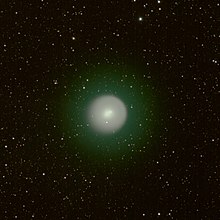Loading AI tools

A comet is an icy small Solar System body that, when passing close to the Sun, heats up and begins to outgas, displaying a visible atmosphere or coma, and sometimes also a tail. These phenomena are due to the effects of solar radiation and the solar wind upon the nucleus of the comet. Comet nuclei range from a few hundred metres to tens of kilometres across and are composed of loose collections of ice, dust, and small rocky particles. The coma and tail are much larger and, if sufficiently bright, may be seen from the Earth without the aid of a telescope. Comets have been observed and recorded since ancient times by many cultures. Comets usually have highly eccentric elliptical orbits, and they have a wide range of orbital periods, ranging from several years to potentially several millions of years.
- I am as familiar with the paths of heaven as with the streets of Nehardea, with the exception of the comet, about which I am ignorant.
- Samuel of Nehardea; Talmud, Berachot 58b
- What you fellows call progress moves by two springs, men and events. But sad to say, from time to time the exceptional is necessary. For events as well as for men, the stock company is not enough; geniuses are needed among men, and revolutions among events. Great accidents are the law; the order of things cannot get along without them; and, to see the apparitions of comets, one would be tempted to believe that Heaven itself is in need of star actors. At the moment you least expect it, God placards a meteor on the wall of the firmament. Some strange star comes along, underlined by an enormous tail. And that makes Caesar die. Brutus strikes him with a knife, and God with a comet.
- Victor Hugo in Les Misérables as translated by Charles Edwin Wilbour
- When the Deep Impact probe hit Comet 9P/Tempel, there was almost no change in brightness. … This outburst by Comet Holmes is extreme!
- Brian G. Marsden, on the unprecedented brightening of Comet Holmes, as quoted in "Mystery Comet Explodes into Brightness" (26 October 2007) at Physorg.com. Within the space of a few hours between 23-24 October 2007 it brightened from a very dim and obscure object requiring powerful telescopes to see into one easily visible to the naked eye.

- I see myself as a huge fiery comet, a shooting star. Everyone stops, points up and gasps "Oh look at that!" Then — whoosh, and I'm gone... and they'll never see anything like it ever again... and they won't be able to forget me — ever.

- When in your middle years
The great comet comes again
Remember me, a child,
Awake in the summer night,
Standing in my crib and
Watching that long-haired star
So many years ago.
Go out in the dark and see
Its plume over water
Dribbling on the liquid night,
And think that life and glory
Flickered on the rushing
Bloodstream for me once, and for
All who have gone before me,
Vessels of the billion-year-long
River that flows now in your veins.- Kenneth Rexroth, in "Halley's Comet"

- I came in with Halley's Comet in 1835. It is coming again next year, and I expect to go out with it. It will be the greatest disappointment of my life if I don't go out with Halley's Comet. The Almighty has said, no doubt: "Now here are these two unaccountable freaks; they came in together, they must go out together.
- Mark Twain, in Mark Twain, a Biography (1909) Twain died in 1910 when Comet Halley was again visible.
- By being seldom seen, I could not stir
But like a comet I was wonder'd at.- William Shakespeare in King Henry IV Part 1, Act 3 Scene 2, lines 46-47.
- Ruling the calm spaciousness of that heaven was the great comet, now green-white, and wonderful for all who had eyes to see.
- H. G. Wells, in In the Days of the Comet (1906)
- At first it had been an almost telescopic speck; it had brightened to the dimensions of the greatest star in the heavens; it had still grown, hour by hour, in its incredibly swift, its noiseless and inevitable rush upon our earth, until it had equaled and surpassed the moon. Now it was the most splendid thing this sky of earth has ever held. I have never seen a photograph that gave a proper idea of it. Never at any time did it assume the conventional tailed outline, comets are supposed to have.
- H. G. Wells, in In the Days of the Comet (1906)
- As I drew near the end, the sense of strangeness returned to me. It was more and more evident to me that this was a different humanity from any I had known, unreal, having different customs, different beliefs, different interpretations, different emotions. It was no mere change in conditions and institutions the comet had wrought. It had made a change of heart and mind.
- H. G. Wells, in In the Days of the Comet (1906)
Wikiwand in your browser!
Seamless Wikipedia browsing. On steroids.
Every time you click a link to Wikipedia, Wiktionary or Wikiquote in your browser's search results, it will show the modern Wikiwand interface.
Wikiwand extension is a five stars, simple, with minimum permission required to keep your browsing private, safe and transparent.



